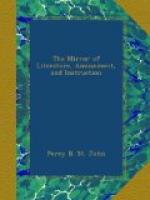The Murderer’s Unction.—Ay, all is safe! He will not again return; the dead sleeps without a witness.—I may lay this working brain upon the bosom that loves me, and not start at night and think that the soft hand around my neck is the hangman’s gripe.
Hogarth.—Nothing makes a picture of distress more sad than the portrait of some individual sitting indifferently looking on in the back-ground. This was a secret Hogarth knew well. Mark his death-bed scenes:—Poverty and Vice worked up into Horror—and the physicians in the corner wrangling for the fee!—or the child playing with the coffin—or the nurse filching what fortune, harsh, yet less harsh than humanity, might have left.
Change of Circumstance.—In our estimate of the ills of life, we never sufficiently take into consideration the wonderful elasticity of our moral frame, the unlooked for, the startling facility with which the human mind accommodates itself to all change of circumstance, making an object and even a joy from the hardest and seemingly the least redeemed conditions of fate. The man who watched the spider in his cell, may have taken, at least, as much interest in the watch, as when engaged in the most ardent and ambitious objects of his former life; and he was but a type of his brethren; all in similar circumstances would have found similar occupation.
Eternal Punishment.—So wonderful in equalizing all states and all times in the varying tide of life, are the two rulers yet levellers of mankind, Hope and Custom, that the very idea of an eternal punishment includes that of an utter alteration of the whole mechanism of the soul in its human state, and no effort of an imagination, assisted by past experience, can conceive a state of torture, which custom can never blunt, and from which the chainless and immaterial spirit can never be beguiled into even a momentary escape.
Prison Solitude.—I have been now so condemned to feed upon myself, that I have become surfeited with the diet.—Aram.
Sensibility.—We may triumph over all weaknesses but that of the affections.
Silence of Cities.—The stillness of a city is far more impressive than that of Nature; for the mind instantly compares the present silence with the wonted uproar.
Suspense.—Of all the conditions to which the heart is subject, suspense is the one that most gnaws, and cankers into the frame. One little month of that suspense, when it involves death, we are told, in a very remarkable work lately published by an eye-witness,[7] is sufficient to plough fixed lines and furrows in a convict of five-and-twenty—sufficient to dash the brown hair with grey, and to bleach the grey to white.
[7] Wakefield on “The Punishment of Death.”
Consolation.—Her high and starry nature could comprehend those sublime inspirations of comfort, which lift us from the lowest abyss of this world to the contemplation of all that the yearning visions of mankind have painted in another.




